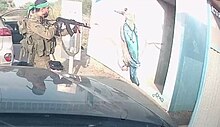Death Shelters

Death Shelters (Hebrew: מיגוניות המוות) is a term used for the fortified shelters located at Re’im Junction and Alumim Junction, where dozens of young Israelis were killed and taken hostage while fleeing the Re'im music festival massacre on October 7, 2023.
Background
As part of the surprise attack on Israel on October 7, 2023, fighters who Israeli sources describe as Hamas' Nukhba forces arrived at a music festival called "Nova Festival," which took place in a forest near Kibbutz Re’im on the night between October 6 and 7, 2023. Hamas forces raided the festival, killing 364 civilians and injuring hundreds of others. Additionally, 44 individuals were kidnapped by Hamas forces and other organizations to the Gaza Strip, some of whom were later released as part of a hostage exchange and "Operation Arnon." During the massacre, the militants also committed sexual assaults and rapes.[1][2] This was the largest terrorist attack in Israel's history.[3][4]
Israeli law has mandated shelters; known as Merkhav Mugan (Hebrew: מרחב מוגן), for several decades. The first security room or shelter was based on a 1951 civil defense law which has gone through several revisions after major events such as being targeted with Scud missiles in the Gulf War. The shelters are reportedly designed to withstand blast and shrapnel from standard weapons, and some protection against chemical and biological weapons.[5][6]
Attacks and abductions during 7 October 2023

Re’im Junction Shelter
Upon the arrival of the militants at the scene, about 30 festival-goers fled to the fortified shelter at Re’im Junction, where they sought refuge, including Aner Shapira and Hersh Goldberg-Polin. According to survivors' testimonies, Shapira was the last to enter the shelter. When Hamas militants reached the shelter, Shapira armed himself with a broken bottle and stood at the entrance to fight off the attackers. One of the militants began throwing grenades one by one through the entrance of the shelter, aiming to harm those inside. Shapira, who stood close to the shelter's entrance, intercepted the grenades and threw them back out, away from the shelter. After blocking seven grenades this way, the eighth grenade exploded in his hand, killing him.[7][8]
Subsequently, Hamas forces and other organizations entered the shelter and violently dragged out the young survivors, some of whom were injured to varying degrees, and loaded them onto trucks to be kidnapped to the Gaza Strip. Among the kidnapped was Hersh Goldberg-Polin, who lost his hand.[7][9]
Alumim Junction Shelter
Some festival participants fled to Alumim Junction, where they hid in the fortified shelter at the junction. The militants reached the shelter and killed most of those inside. Noam Cohen, one of the survivors of the massacre, published "Noam’s Song 2," documenting the moments of terror in the shelter, and later in a musical single with Maor Ashkenazi.[10][11]
Aftermath
On June 24, 2024, the Headquarters for the Return of the Hostages and Missing Persons released a video documenting the kidnapping of Hersh Goldberg-Polin, Or Levi, and Elia Cohen from the shelter.[12] The Israel National Roads Company was criticized for repainting the interior of the shelter, thereby covering up evidence of the violence and bloodshed that took place there.[13]
References
- ^ "Israel investigates an elusive, horrific enemy: Rape as a weapon of war". Washington Post. 2023-11-25. Retrieved 2024-06-30.
- ^ "How Hamas Weaponized Sexual Violence on Oct. 7 - The New York Times". The New York Times. 2024-03-06. Archived from the original on 2024-03-06. Retrieved 2024-06-30.
- ^ Byman, Daniel; McCabe, Riley; Palmer, Alexander; Doxsee, Catrina; Holtz, Mackenzie; Duff, Delaney (2023-12-19). "Hamas's October 7 Attack: Visualizing the Data". Mackenzie.
- ^ "October 7 - How Hamas Attacked Israel, Minute-by-minute".
- ^ "Living under the rocket's roar". The Jerusalem Post | JPost.com. 2011-11-15. Retrieved 2024-10-14.
- ^ Building for a Secure Future
- ^ a b "ענר ז"ל הציל שמונה במסיבה ברעים: "זרק חזרה כל רימון שהושלך למיגונית, השמיני התפוצץ"". www.maariv.co.il (in Hebrew). 2023-11-15. Retrieved 2024-06-30.
- ^ "Video Shows Hero Israeli Soldier Save Oct. 7 Festival-Goers by Tossing Back 7 Hamas Grenades Before He's Killed by 8th - The Messenger". 2023-11-14. Archived from the original on 2023-11-14. Retrieved 2024-06-30.
- ^ Reals, Tucker (2024-04-25). "Hamas releases video of injured Israeli-American hostage Hersh Goldberg-Polin - CBS News". www.cbsnews.com. Retrieved 2024-06-30.
- ^ Kershner, Isabel; Elkayam, Amit (2023-11-11). "They Ran Into a Bomb Shelter for Safety. Instead, They Were Slaughtered". The New York Times. ISSN 0362-4331. Retrieved 2024-06-30.
- ^ "מיליון צפיות ב-3 ימים: השיר המרסק על "מיגונית המוות"". mako. 2023-10-28. Retrieved 2024-06-30.
- ^ צ'כנובר, יעל (2024-06-24). "הערב: יפורסם סרטון חטיפת הירש, אור ואליה מ"מיגונית המוות"". Ynet (in Hebrew). Retrieved 2024-06-30.
- ^ "הזיכרון שנמחק מ"מיגוניות המוות": "מוחקים את ההיסטוריה" | חדשות 13". רשת 13 (in Hebrew). Retrieved 2024-06-30.

